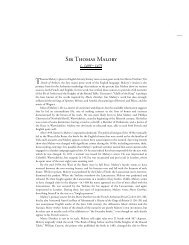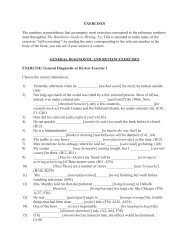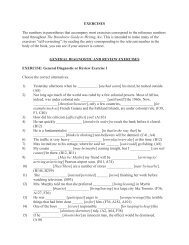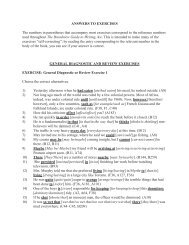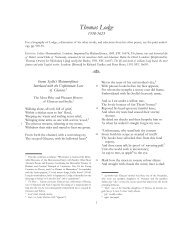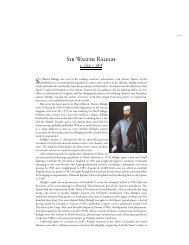Contexts: The Abolition of Slavery - Broadview Press Publisher's Blog
Contexts: The Abolition of Slavery - Broadview Press Publisher's Blog
Contexts: The Abolition of Slavery - Broadview Press Publisher's Blog
You also want an ePaper? Increase the reach of your titles
YUMPU automatically turns print PDFs into web optimized ePapers that Google loves.
4 <strong>Contexts</strong><br />
tion by the Society for Effecting the <strong>Abolition</strong> <strong>of</strong> the<br />
Slave Trade. In 1789 Falconbridge also testified as<br />
to the horrors <strong>of</strong> the trade before the Parliamentary<br />
Committee investigating the issue.<br />
<strong>The</strong> men negroes, on being brought aboard the ship, are<br />
immediately fastened together, two and two, by handcuffs<br />
on their wrists, and by irons rivetted on their legs.<br />
<strong>The</strong>y are then sent down between the decks, and placed<br />
in an apartment partitioned <strong>of</strong>f for that purpose. <strong>The</strong><br />
women likewise are placed in a separate apartment<br />
between decks, but without being ironed. And an<br />
adjoining room, on the same deck, is besides appointed<br />
for the boys. Thus are they all placed in different<br />
apartments.<br />
But at the same time, they are frequently stowed so<br />
close, as to admit <strong>of</strong> no other posture than lying on their<br />
sides. Neither will the height between decks, unless<br />
directly under the grating, permit them the indulgence<br />
<strong>of</strong> an erect posture; especially where there are platforms,<br />
which is generally the case. <strong>The</strong>se platforms are a kind<br />
<strong>of</strong> shelf, about eight or nine feet in breadth, extending<br />
from the side <strong>of</strong> the ship towards the centre. <strong>The</strong>y are<br />
placed nearly midway between the decks, at the distance<br />
<strong>of</strong> two or three feet from each deck. Upon these the<br />
negroes are stowed in the same manner as they are on<br />
the deck underneath.<br />
In each <strong>of</strong> the apartments are placed three or four<br />
large buckets, <strong>of</strong> a conical form, being near two feet in<br />
diameter at the bottom, and only one foot at the top,<br />
and in depth about twenty-eight inches; to which, when<br />
necessary, the negroes have recourse. It <strong>of</strong>ten happens,<br />
that those who are placed at a distance from the buckets,<br />
in endeavouring to get to them, tumble over their<br />
companions, in consequence <strong>of</strong> their being shackled.<br />
<strong>The</strong>se accidents, although unavoidable, are productive<br />
<strong>of</strong> continual quarrels, in which some <strong>of</strong> them are always<br />
bruised. In this distressed situation, unable to proceed,<br />
and prevented from getting to the tubs, they desist from<br />
the attempt; and, as the necessities <strong>of</strong> nature are not to<br />
be repelled, ease themselves as they lie. This becomes a<br />
fresh source <strong>of</strong> broils and disturbances, and tends to<br />
render the condition <strong>of</strong> the poor captive wretches still<br />
more uncomfortable. <strong>The</strong> nuisance arising from these<br />
circumstances, is not unfrequently increased by the tubs<br />
being much too small for the purpose intended, and<br />
their being usually emptied but once every day. <strong>The</strong> rule<br />
for doing this, however, varies in different ships, according<br />
to the attention paid to the health and convenience<br />
<strong>of</strong> the slaves by the captain …<br />
<strong>The</strong> diet <strong>of</strong> the negroes, while on board, consists<br />
chiefly <strong>of</strong> horse-beans, boiled to the consistence <strong>of</strong> a<br />
pulp; <strong>of</strong> boiled yams and rice, and sometimes <strong>of</strong> a small<br />
quantity <strong>of</strong> beef or pork. <strong>The</strong> latter are frequently taken<br />
from the provisions laid in for the sailors. <strong>The</strong>y sometimes<br />
make use <strong>of</strong> a sauce, composed <strong>of</strong> palm-oil, mixed<br />
with flour, water, and pepper, which the sailors call<br />
slabber-sauce. Yams are the favourite food <strong>of</strong> the Eboe,<br />
or Bight negroes, and rice or corn, <strong>of</strong> those from the<br />
Gold and Windward Coasts; each preferring the produce<br />
<strong>of</strong> their native soil …<br />
<strong>The</strong>y are commonly fed twice a day, about eight<br />
o’clock in the morning and four in the afternoon. In<br />
most ships they are only fed with their own food once a<br />
day. <strong>The</strong>ir food is served up to them in tubs, about the<br />
size <strong>of</strong> a small water bucket. <strong>The</strong>y are placed round these<br />
tubs in companies <strong>of</strong> ten to each tub, out <strong>of</strong> which they<br />
feed themselves with wooden spoons. <strong>The</strong>se they soon<br />
lose, and when they are not allowed others, they feed<br />
themselves with their hands. In favourable weather they<br />
are fed upon deck, but in bad weather their food is given<br />
them below. Numberless quarrels take place among<br />
them during their meals; more especially when they are<br />
put upon short allowance … <strong>The</strong>ir allowance <strong>of</strong> water<br />
is about half a pint each at every meal. It is handed<br />
round in a bucket, and given to each negroe in a pannekin;<br />
a small utensil with a strait handle, somewhat<br />
similar to a sauce-boat …<br />
Upon the negroes refusing to take sustenance, I have<br />
seen coals <strong>of</strong> fire, glowing hot, put on a shovel, and<br />
placed so near their lips, as to scorch and burn them.<br />
And this has been accompanied with threats, <strong>of</strong> forcing<br />
them to swallow the coals, if they any longer persisted in<br />
refusing to eat. <strong>The</strong>se means have generally had the<br />
desired effect. I have also been credibly informed, that<br />
a certain captain in the slave trade, poured melted lead<br />
on such <strong>of</strong> the negroes as obstinately refused their food.<br />
Exercise being deemed necessary for the preservation<br />
<strong>of</strong> their health, they are sometimes obliged to dance,<br />
when the weather will permit their coming on deck. If



